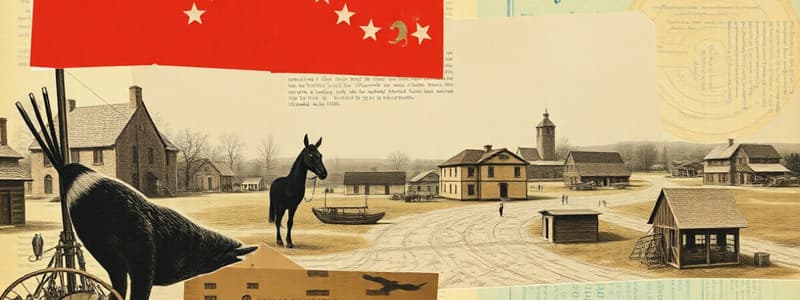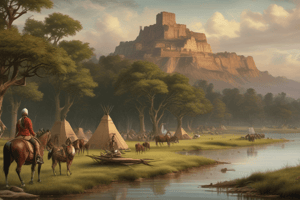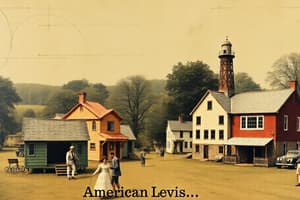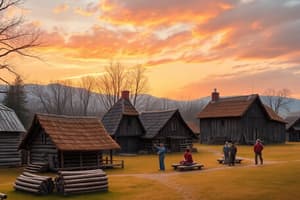Podcast
Questions and Answers
Who was the leader of the Moravians, known for their missionary work?
Who was the leader of the Moravians, known for their missionary work?
- Roger Williams
- David Brainerd
- Count von Zinzendorf (correct)
- William Penn
Which colony was established as a safe haven for English Catholics?
Which colony was established as a safe haven for English Catholics?
- Virginia
- Maryland (correct)
- Pennsylvania
- Massachusetts
What was the first permanent European settlement in the New World?
What was the first permanent European settlement in the New World?
- Roanoke
- Jamestown
- St. Augustine (correct)
- Plymouth
Who was the author of Of Plymouth Plantation?
Who was the author of Of Plymouth Plantation?
Which of the following individuals is associated with the Great Awakening?
Which of the following individuals is associated with the Great Awakening?
What is the name of the colony that was founded for religious freedom and is now the state of New York?
What is the name of the colony that was founded for religious freedom and is now the state of New York?
What was the first written agreement for self-government in America?
What was the first written agreement for self-government in America?
What was the name given to the group of English settlers who arrived in Jamestown in 1607 on ships named the Susan Constant, Godspeed, and Discovery?
What was the name given to the group of English settlers who arrived in Jamestown in 1607 on ships named the Susan Constant, Godspeed, and Discovery?
Flashcards
Roanoke
Roanoke
The colony founded by Sir Walter Raleigh, known as 'The Lost Colony'.
Mayflower Compact
Mayflower Compact
The first written agreement for self-government in America.
Jamestown
Jamestown
The first permanent English settlement in America founded in 1607.
House of Burgesses
House of Burgesses
Signup and view all the flashcards
Maryland
Maryland
Signup and view all the flashcards
Quakers
Quakers
Signup and view all the flashcards
George Whitefield
George Whitefield
Signup and view all the flashcards
Squanto
Squanto
Signup and view all the flashcards
Study Notes
Early American Settlements and Colonies
- St. Augustine was the first permanent European settlement in the New World.
- Roanoke, founded by Sir Walter Raleigh, is known as "The Lost Colony."
- The English defeated the Spanish Armada in 1588.
- Jamestown was founded in 1607.
- The Separatists initially moved to Holland for religious freedom.
- The Pilgrims established Plymouth in 1620.
- The Mayflower Compact was the first written agreement for self-government in America.
- The Ole' Deluder Satan Act (1647) established the first public schools in Massachusetts.
- The Fundamental Orders of Connecticut was the first written constitution in America.
- The House of Burgesses was Virginia's elected body of representatives.
- The Susan Constant, Godspeed, and Discovery brought settlers to Jamestown.
- Samoset was the first Native American to welcome the Pilgrims.
- Savannah was Georgia's first permanent settlement.
- Virginia was the first royal colony, owned by the King of England.
- Charleston was South Carolina's first permanent settlement.
- Williamsburg became Virginia's capital in 1699.
- Lord Baltimore established Maryland as a colony for English Catholics.
- The Ark and the Dove brought settlers to Maryland for religious freedom.
- New Netherland was the colony that became New York.
- Peter Stuyvesant was the Dutch governor of New Netherland, who surrendered to the English.
- Swedes in Delaware built the first log cabins.
- The Quakers were formally known as the Society of Friends.
- William Penn established Philadelphia.
- Count von Zinzendorf led the Moravian missionary group.
- Squanto helped the Pilgrims survive.
- John Cabot claimed part of North America for England in 1497.
- David Brainerd was an early missionary spurred by the Great Awakening.
- Lord De La Warr was the first governor of Jamestown.
- Elder Brewster was the minister of the Plymouth colony.
- William Bradford was the second governor of Plymouth and author of Of Plymouth Plantation.
- Roger Williams founded the first colony offering complete religious freedom.
- Jonathan Edwards was a Connecticut-born preacher and a leader of the Great Awakening.
- George Whitefield was an English evangelist who preached to large crowds in the colonies.
- Phillis Wheatley was America's first black woman writer to publish a book.
- Captain Miles Standish protected the Pilgrims.
- James Oglethorpe planned and directed the building of Georgia.
- John Rolfe married Pocahontas.
Key Figures and Events
- Colonial Leaders: William Penn, Roger Williams, Lord Baltimore, William Bradford, John Rolfe, James Oglethorpe, Peter Stuyvesant, Jonathan Edwards, George Whitefield, David Brainerd.
- Early Religious Groups: Pilgrims, Quakers, Society of Friends, Moravians, English Catholics.
Studying That Suits You
Use AI to generate personalized quizzes and flashcards to suit your learning preferences.




